Date published: 30 May 2019
Tokyo is dotted with fascinating sightseeing spots, from traditional temples to modern pop culture. Most of the major sightseeing areas such as Asakusa, Shinjuku, Ginza, and Akihabara are well-covered in every guidebook, but Japan’s charms are just as plentiful outside the city center. With a train ride of about one or two hours, you’ll find yourself in an entirely different Japan, far away from the hustle and bustle, and emerged in local, traditional culture!
We’ve selected our 10 favorite Tokyo day trip destinations that offer lush natural scenery, rich history, and an authentic taste of Japan. Hop on the train!
1. Kamakura (Kanagawa): A Tranquil Escape Steeped in History and Charm
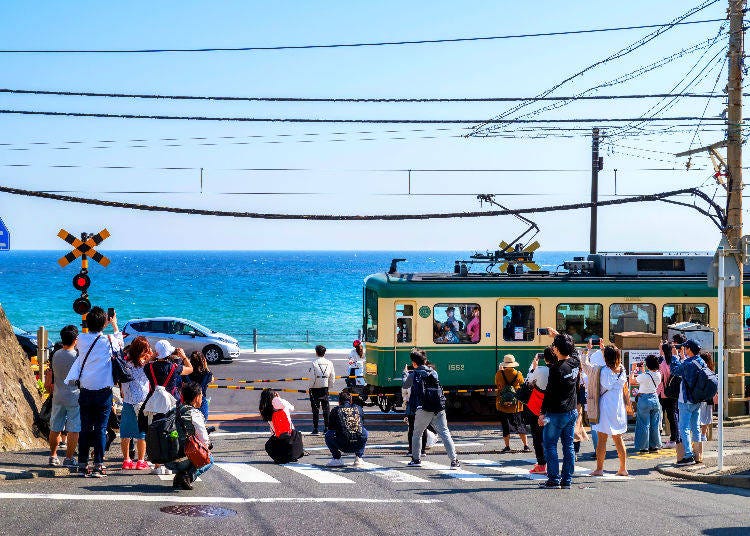
Enoden aka Enoshima Electric Railway (picture cells / Shutterstock.com)
Kamakura, sometimes referred to as “Little Kyoto,” is a historically rich town located just an hour south of Tokyo by train. This ancient capital is celebrated for its peaceful shrines and temples, offering visitors a serene retreat steeped in Japanese history and culture. Ideal for a day trip, Kamakura invites travelers to explore its scenic beauty, historical sites, and vibrant local life, providing a perfect blend of nature and tradition.
Must-Visit Places in Kamakura
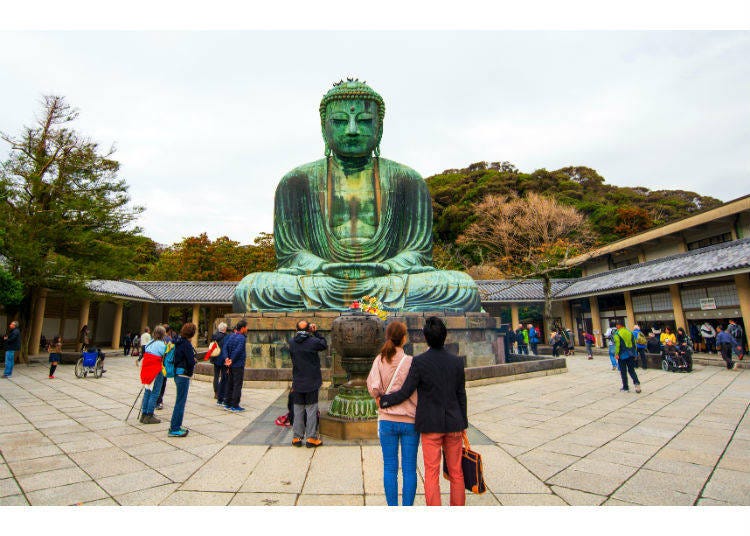
The Great Buddha of Kamakura at Kotoku-in Temple (khuntapol / Shutterstock.com)
1. Hokoku-ji Temple: A serene bamboo sanctuary offering a tranquil experience amidst towering green stalks, perfect for meditation and reflection. Imagine strolling along a path dappled with sunlight filtering through the leaves, the gentle rustle of bamboo the only sound that breaks the peaceful silence. Hokoku-ji provides a welcome escape from the bustle and a chance to truly connect with your inner zen.
2. Tsurugaoka Hachimangu: A historic Shinto shrine that is central to Kamakura’s cultural identity, featuring traditional architecture and a grand stairway. Steeped in history, Tsurugaoka Hachimangu offers a glimpse into the spiritual heart of Kamakura.
3. Kotoku-in: Home to the iconic Great Buddha of Kamakura, this temple grounds the colossal bronze statue that has stood since 1252. Towering at nearly 40 feet tall, the Great Buddha exudes serenity and inspires awe.
4. Hasedera Temple: Celebrated for its seasonal flowers, this temple provides a picturesque setting with ocean views and a multi-tiered wooden Kannon hall.
5. Kencho-ji: The oldest Zen training monastery in Japan, offering a peaceful retreat with its dragon-painted ceiling and expansive temple grounds. Kencho-ji beckons history buffs and spiritual seekers alike. Explore the serene temple grounds and experience the tranquility that has fostered Zen practice for centuries.
6. Enoshima Island: Around a 26-minute ride on the Enoden away from Kamakura, Enoshima Island offers a delightful escape with its beaches, shrines, and enchanting atmosphere. For a change of pace, explore the charming shops and restaurants, visit the unique shrines (and cave!), and soak up the island’s magic.
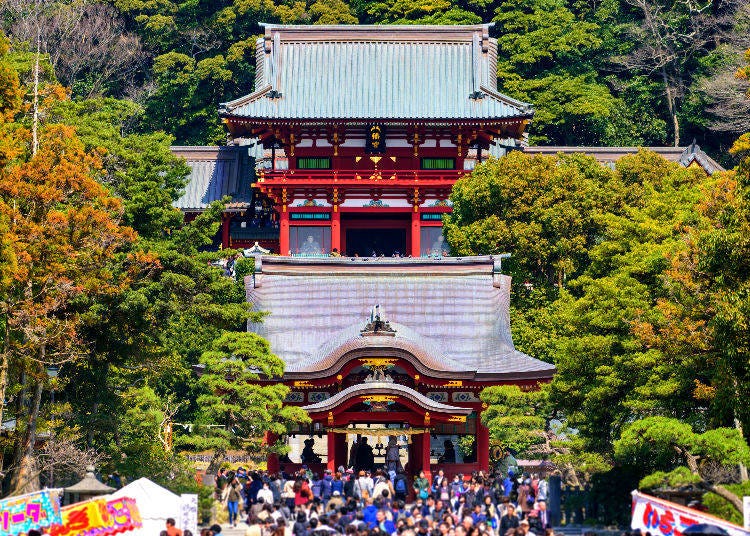
Tsuruoka Hachimangu
- Access from Tokyo: Around an hour from Tokyo Station (JR Yokosuka-Sobu Line) or Shinjuku Station to Kamakura Station (JR Shōnan-Shinjuku Line)
- Applicable rail passes: Covered under the JR Pass for Whole Japan, JR TOKYO Wide Pass, Hakone Kamakura 3-Day Ticket Pass
- Must-see spots: Tsurugaoka Hachimangu, Hasedera Temple, Hokokuji (the bamboo forest temple), Kōtoku-in, and the Great Buddha of Kamakura, “Enoden” train
- Notes: Central Kamakura is not that spacious and can be easily explored on foot, but it takes about 25 minutes with the Enoden (Enoshima Electric Railway) Line to go to Enoshima. If you want to visit both Kamakura and Enoshima, it is recommended to account for that time and arrive early.
Recommended tours of Kamakura
2. Nikko (Tochigi): Where History Meets Nature’s Majesty

Shinkyo Bridge, Nikko
Nikko, set in the heart of Tochigi Prefecture’s mountainous terrain, is a harmonious blend of cultural heritage and natural splendor, located just two hours north of Tokyo. This enchanting town, rich in history, mysticism, and breathtaking landscapes, stands as a testament to Japan’s ability to preserve its past while offering awe-inspiring natural wonders, making it an essential visit for those seeking adventure and tranquility alike.
Must-Visit Places in Nikko
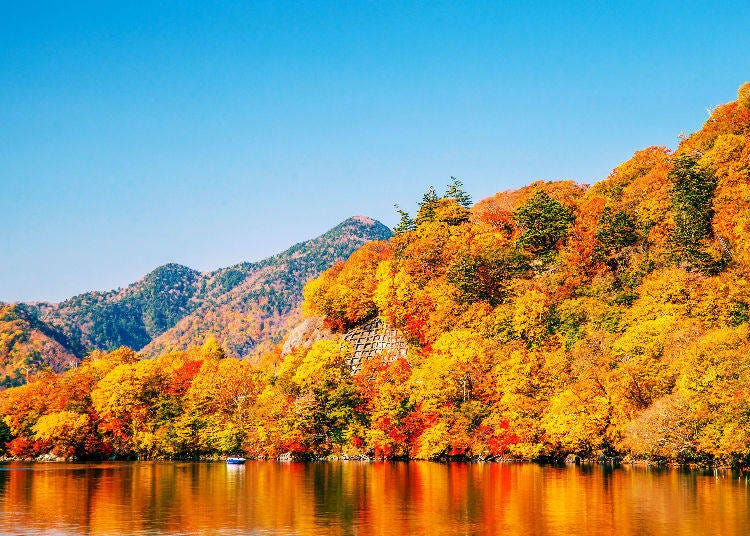
Lake Chuzenji, Nikko
1. Toshogu Shrine: A lavishly decorated shrine complex and UNESCO World Heritage site, dedicated to the shogun Tokugawa Ieyasu. Prepare to be dazzled by intricate carvings, ornate gold leaf, and vibrant colors found here.
2. Kegon Falls: Kegon Falls offers breathtaking views and a nature-rich atmosphere. Witness the power of nature as the 300-foot waterfall cascades into a lush green gorge. Enjoy the fresh air and mist as you take in the stunning scenery.
3. Lake Chuzenji: A scenic volcanic lake created by Mount Nantai’s eruption, ideal for boating and lakeside strolls. Rent a boat and admire the majestic Mount Nantai reflected on the crystal-clear water, or simply take a leisurely stroll along the lakeside path and soak in the tranquility.
4. Rinno-ji Temple: A beautiful temple featuring a garden and the three Buddha hall (one for each sacred mountain of Nikko), symbolizing Nikko’s spiritual heritage.
5. Edo Wonderland Nikko Edomura: A cultural theme park that transports visitors back to the Edo period with its historical reenactments and traditional crafts. Watch captivating historical reenactments, try your hand at traditional crafts, and immerse yourself in the fascinating culture of this bygone era.
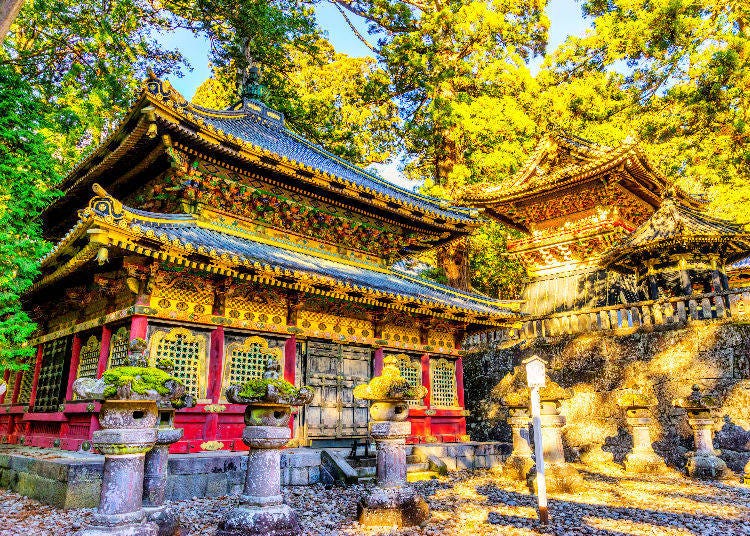
Nikko Toshogu Temple

- Access from Tokyo: Just under 2 hours from Tobu Asakusa Station to Tobu Nikko Station (via Limited Express)
- Applicable rail passes: NIKKO PASS Digital Ticket, Tobu Railway Nikko Area Pass
- Must-see spots: Nikko Tosho-gu, Kegon Falls, Shinkyo Bridge
- Notes: It depends on season and area, but generally speaking, Nikko tends to be around 3-7 degrees cooler than Tokyo. Even in summer, it’s a good idea to bring a light jacket for cool mornings and evenings. Winter is particularly cold with temperatures below freezing, so dress appropriately.
Recommended Nikko tours
3. Mount Fuji (Shizuoka/Yamanashi): Journey to the Crown Jewel of Japan
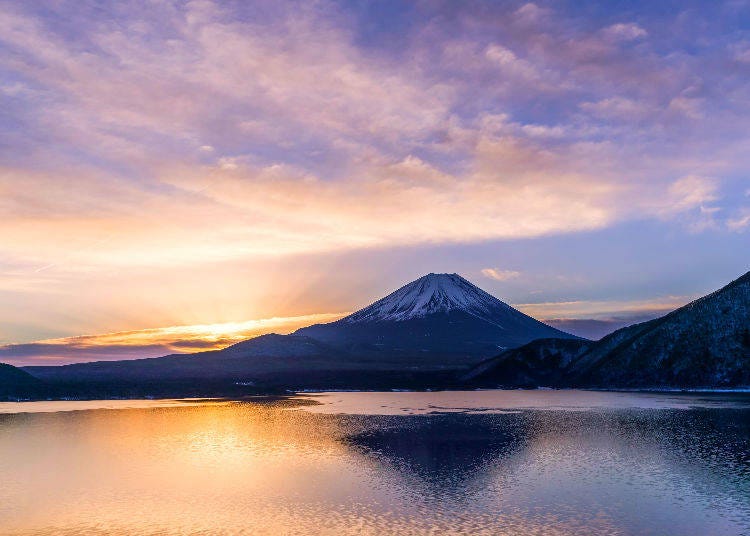
Mount Fuji is not merely a natural wonder but a cultural phenomenon, standing tall at 3,776 meters. Its silhouette is an enduring symbol of Japan, inspiring generations of artists, poets, and pilgrims. Recognized as a UNESCO World Heritage Site in 2013, Mount Fuji is a testament to its profound influence on Japanese culture and spirituality, making it an essential visit for those exploring Japan.
Must-Visit Places around Mt. Fuji
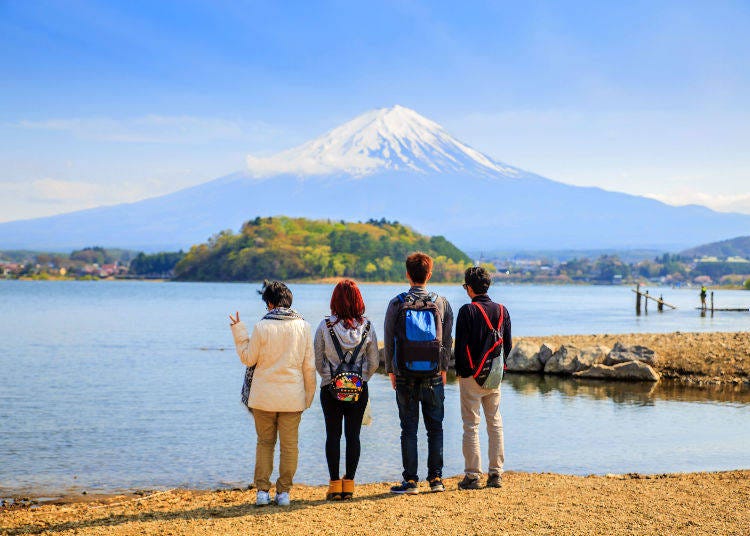
1. Fuji Five Lakes: The collective name for the five lakes offering distinct views of Mount Fuji and recreational activities like boating and fishing. Imagine crystal-clear lakes reflecting the majestic form of Mount Fuji. The Fuji Five Lakes region beckons nature enthusiasts and photographers alike. Explore the lakes by boat, cast a line and try your luck fishing, or simply admire the breathtaking scenery—a true feast for the senses.
2. Oshino Hakkai: A set of eight ponds filled with melted snow from Mount Fuji is revered for its clarity and is considered sacred. A cultural and history museum, filled with interesting relics from ages past, can also be found here.
3. Chureito Pagoda: This five-story pagoda provides one of the most iconic views of Mount Fuji, especially stunning during cherry blossom season.
4. Fuji-Q Highland: An amusement park known for its thrilling roller coasters and attractions with Mount Fuji as the backdrop. Experience the ultimate adrenaline rush with a backdrop like no other!
5. Shiraito Falls: This picturesque series of waterfalls, located at the base of Mount Fuji, cascades in thin white streams resembling silk threads. In clear weather, enjoy photographing Mount Fuji overlooking the falls from the distance.
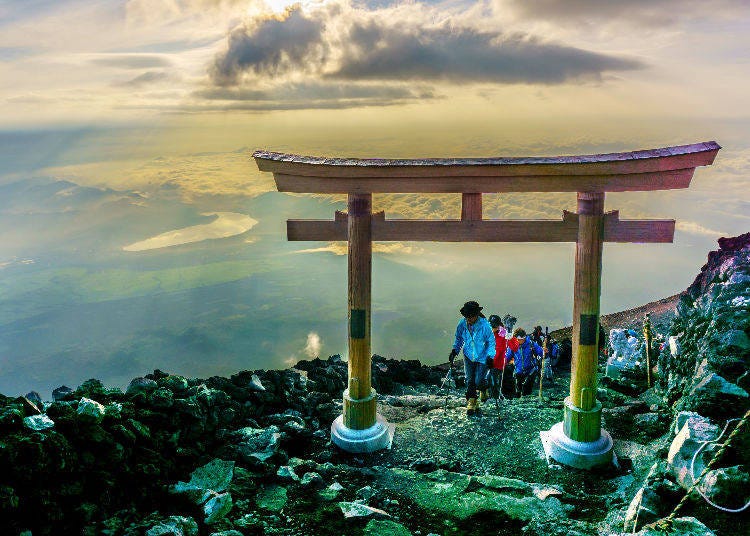
At the top of Mount Fuji
- Access from Tokyo (Rail): Shinjuku Station to Otsuki Station; then Otsuki Station to Fujisan Station (Fuji Kyuko) (around 2.5 hours)
- Access from Tokyo (Bus): Shinjuku Expressway Bus Terminal to Kawaguchiko (or Fuji Subaru Line 5th Station) (between 1.5 and 2.5 hours)
- Must-see spots: Fuji Five Lakes (Yamanakako, Kawaguchiko, Motosuko, Saiko, Shojiko)
- Notes: People usually spend the night at a mountain hut when climbing Mount Fuji. Some do the climb in a single day starting at dawn, but we do not recommend this due to possible altitude sickness or other issues. If you plan on climbing Mount Fuji, do so with sufficient preparation.
Recommended Mt. Fuji area tours
4. Hakone (Kanagawa): Paradise of Hot Springs, Breathtaking Views, and Volcanic Wonders
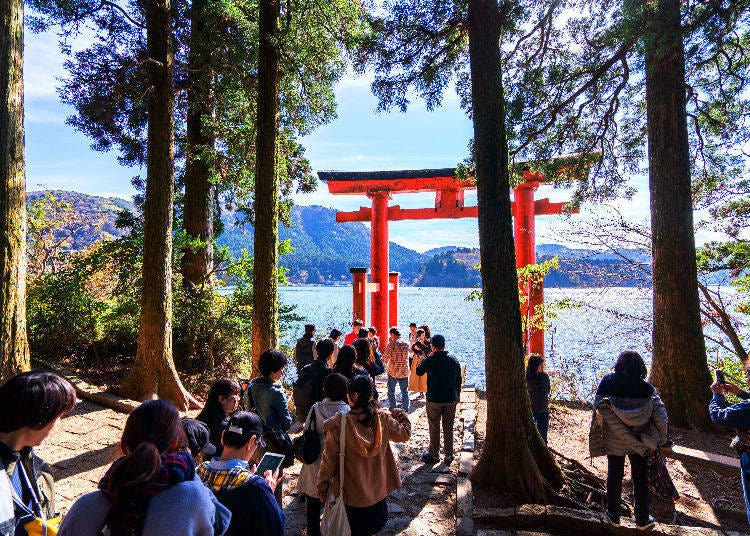
Jheng Yao / Shutterstock.com
Hakone, nestled within the scenic Hakone caldera and surrounded by the majestic peaks of the Hakone Mountain Range, serves as a sanctuary for those seeking tranquility and adventure alike. This volcanic basin, brimming with cultural treasures and natural beauty, offers a year-round destination for relaxation, rejuvenation, and exploration, making it a favorite escape for travelers.
Must-Visit Places in Hakone
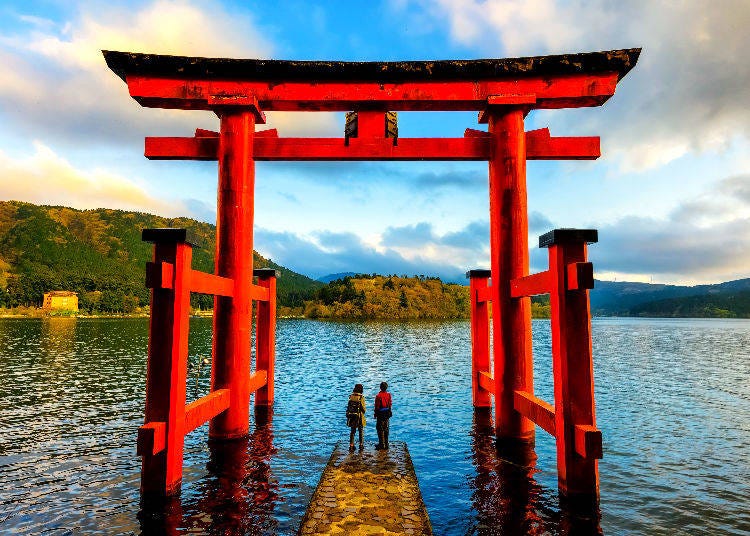
1. Hakone Open-Air Museum: An outdoor museum displaying a diverse collection of artworks set against the backdrop of Hakone’s natural beauty.
2. Hakone Shrine: A mystical shrine nestled on the shores of Lake Ashi, famous for its torii gate that appears to float on the water.
3. Owakudani: A volcanic valley with active sulfur vents and hot springs, where visitors can enjoy black eggs boiled in the natural waters.
4. Pola Museum of Art: An art museum surrounded by forests, featuring a collection of modern art and glassworks.
5. Lake Ashi: A crater lake with views of Mount Fuji on clear days, popular for sightseeing cruises and its serene, reflective waters.
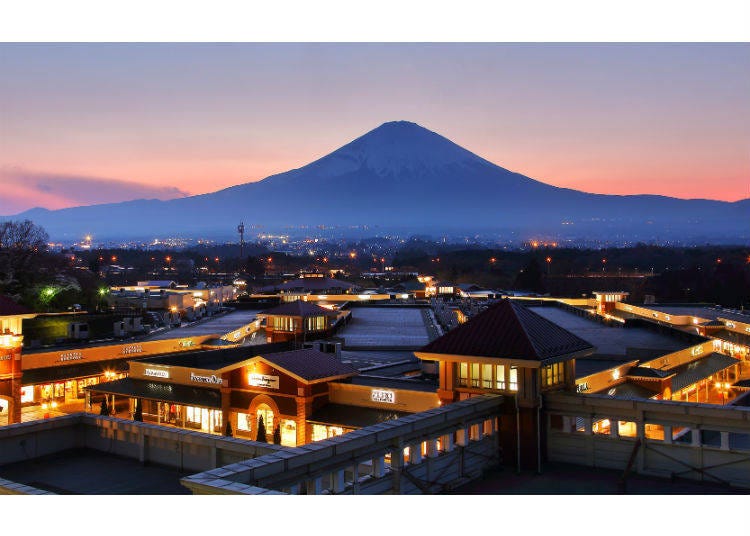
Night view of Hakone city (bundit jonwises / Shutterstock.com)
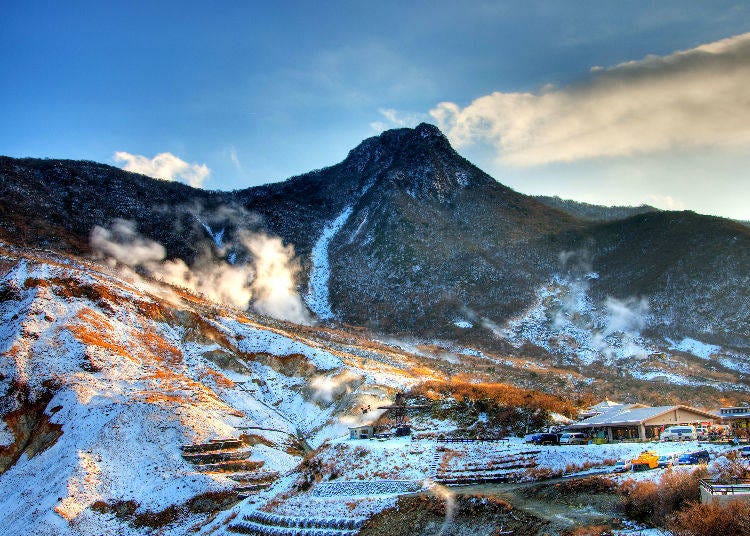
Hell Valley, Owakudani
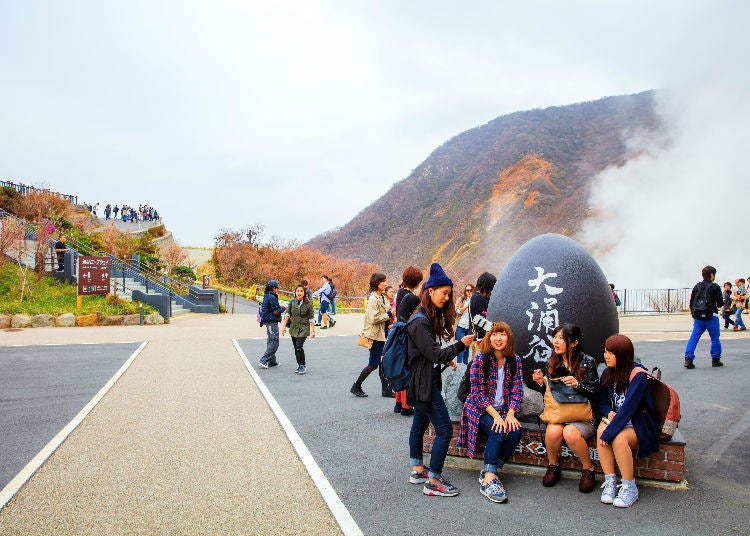
Hell Valley, Owakudani (Yellow Cat / Shutterstock.com)
- Access from Tokyo: Tokyo Station to Odawara Station (JR Shinkansen “Kodama”), Odawara Station to Hakone Yumoto Station (Hakone Tozan Railway); around 1 hour 15 minutes away from Tokyo
- Must-see spots: Hot springs, Lake Ashi, Hakone Ropeway, Hakone Tozan Line
- Notes: Day-trip hot spring facilities are usually not open all day and reservations are necessary for outdoor hot springs. Make sure to confirm business hours and other details in advance.
Recommended tours of Hakone
5. Izu (Shizuoka): Paradise of Beaches, Hot Springs, and Serene Getaways
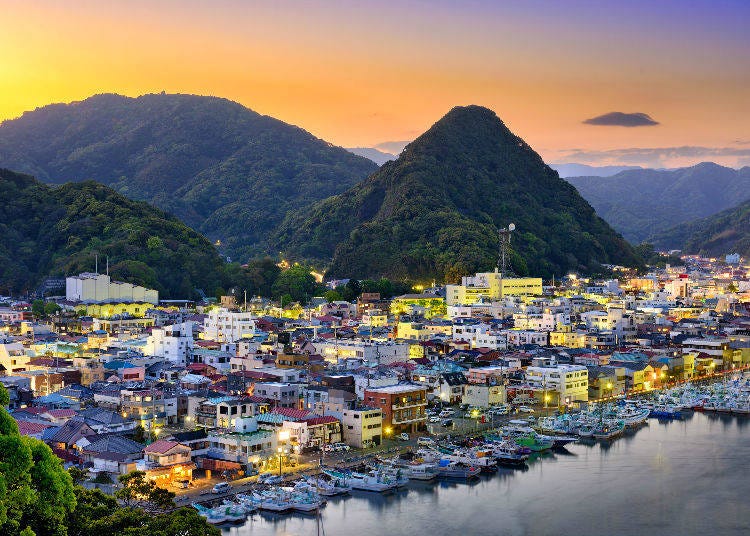
The Izu Peninsula, a picturesque retreat from city life, offers a landscape rich with natural beauty, from stunning beaches and majestic mountains to hot springs and cultural landmarks. With its mild climate and diverse attractions, Izu caters to a wide range of interests, including relaxation, adventure, and cultural discovery, providing visitors with a memorable journey through its scenic and cultural wonders.
Must-Visit Places in Izu
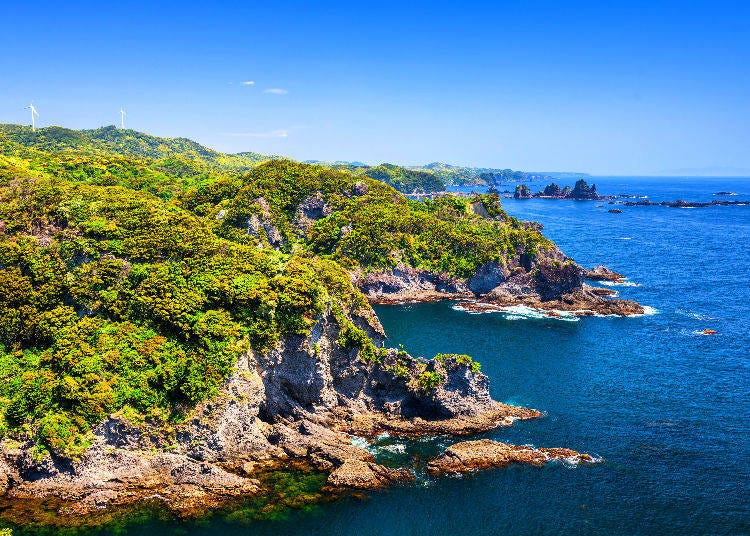
1. Shirahama Beach: A white sandy beach known for its clear waters and popular for swimming and surfing.
2. Mount Omuro: An extinct volcano offering panoramic views of the Izu Peninsula and a unique archery experience inside its crater.
3. Jogasaki Coast: A scenic coastline with a walking trail that offers views of the rugged cliffs and the ocean.
4. Izu Granpal Park: An amusement park with a variety of attractions, including a Ferris wheel with views of Mount Fuji (on clear days). Take your fun to new heights!
5. Kawazu Nanadaru Waterfalls: A series of seven waterfalls in a lush valley, each with its own charm and a walking trail connecting them.
6. Kawazu: Early blooming cherry blossoms – Beat the crowds and witness the magic of cherry blossoms in Kawazu, known for their blooms appearing earlier than most places in Japan.
7. Shimoda: This city on the southeastern Izu Peninsula is known for its busy port, hot springs, and role in opening up Japan to international relations in the mid-19th century.
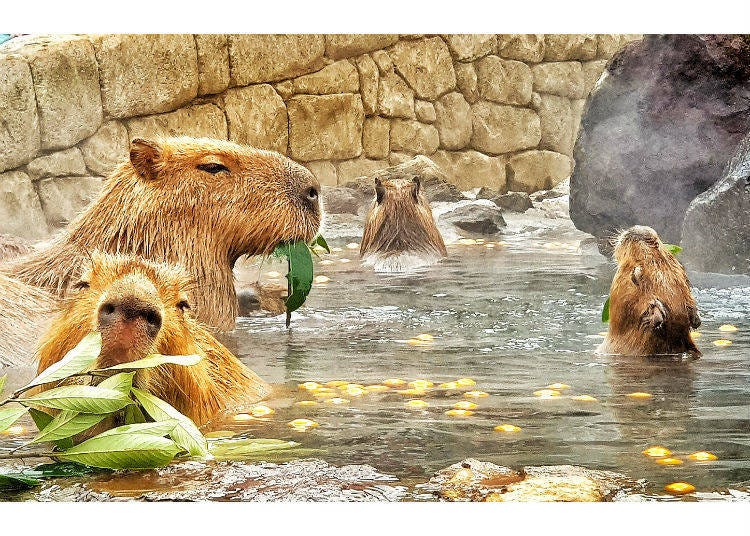
Capybaras enjoying hot spring at Izu Shaboten Zoo (icyyoke / Shutterstock.com)
- Access from Tokyo: Shinagawa Station to Atami Station (Tokaido Main Line), Atami Station to Ito Station (JR Ito Line); roughly 2 hours from Tokyo
- Must-see spots: Hot springs, Shuzenji, Kawazu Nanadaru Waterfall, Izunokuni Panorama Park
- Notes: Izu can roughly be divided into four areas: Higashi-Izu (East), Minami-Izu (South), Nishi-Izu (West), Naka-Izu (Central). The Shuzenji hot springs are in Naka-Izu, while Shirahama Beach and its clear water is in Minami-Izu. It is impossible to see the entire Izu Peninsula in one day, so plan ahead what you would like to visit.
Recommended tours of Izu
6. Atami (Shizuoka): Japan’s Idyllic Hot Spring Resort Area

Atami, nestled on the eastern coast of the Izu Peninsula, is a celebrated hot spring resort town that marries the tranquility of natural thermal baths with the vibrancy of Japanese cultural experiences. Known for its scenic beauty, great seafood, and relaxing hot springs, Atami has been a destination of relaxation and rejuvenation since the Edo period, offering a perfect retreat for those in search of leisure and exploration.
Must-Visit Places in Atami
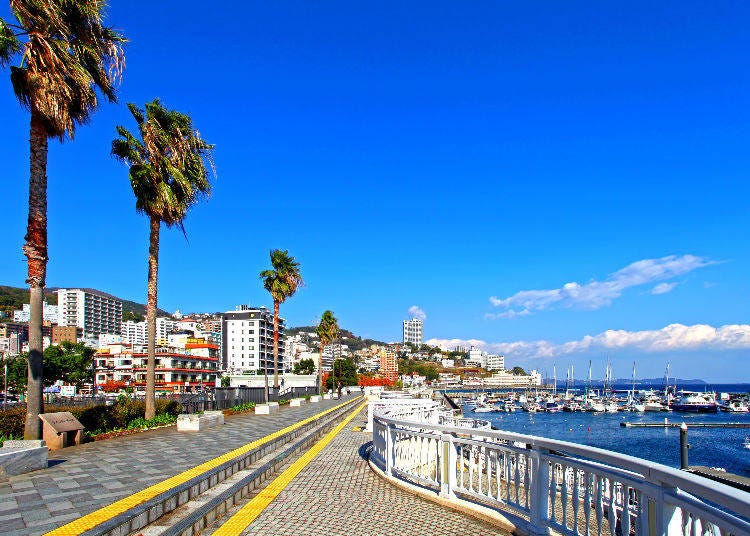
1. MOA Museum of Art: Showcases a wide range of Japanese art and artifacts, including paintings, ceramics, and sculptures.
2. Atami Castle: A modern castle with panoramic views of the city and the sea, featuring exhibits on Japanese history and culture.
3. Kinomiya Shrine: An ancient shrine famous for its thousand-year-old sacred camphor tree, believed to bring good luck.
4. Atami Sun Beach: A popular seaside spot for swimming and sunbathing, with views of Sagami Bay.
5. Atami Plum Garden: A beautiful garden with over 450 plum trees that blossom in vibrant colors from late winter to early spring.
6. ACAO Forest: ACAO Forest unfolds as a vast floral haven, segmented into 13 uniquely themed gardens. This vibrant sanctuary comes alive with the hues of rape blossoms and Atami sakura in January, blankets itself with 100,000 tulips in April, and is adorned with 4,000 roses between May and June.
- Access from Tokyo: Shinagawa Station to Atami Station (Tokaido Main Line); around 1.5 hours from Tokyo
- Must-see spots: Hot springs, foot baths, shopping streets, Nishikigaura, Atami Castle, Hashiriyu
- Notes: Most of Atami’s main sights are within walking distance but keep in mind that there are a lot of steep slopes. If you’re tired, feel free to use a taxi or bus.
Recommended tours of Atami
7. Yokohama (Kanagawa): Where History, Romance, and Modern Marvels Collide

Pongchart B / Shutterstock.com
Yokohama, Japan’s vibrant port city, effortlessly merges historic allure with modern innovation, making it a beloved destination. Recognized for its romantic ambiance, this city offers a dynamic array of experiences, from the echoes of its trade-rich history to the futuristic skyline of Minato Mirai. Voted as the most desirable city to live in Japan, Yokohama captivates both travelers and locals with its unique charm and lively energy.
Must-Visit Places in Yokohama
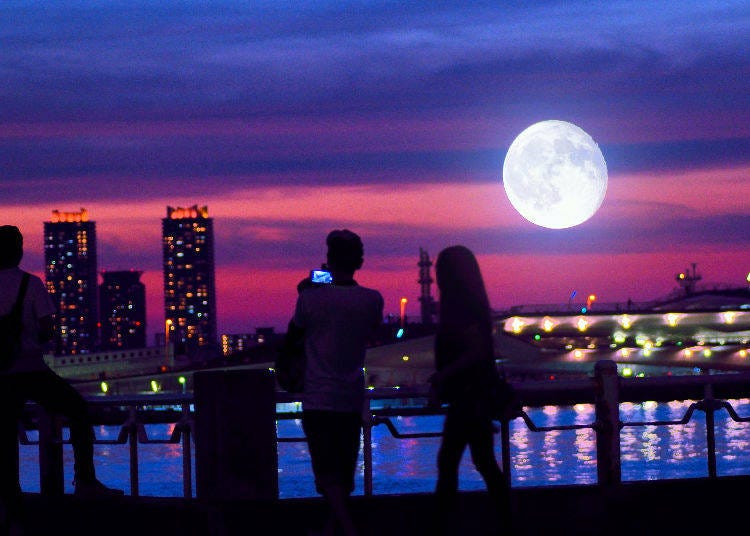
Minatomirai in Yokohama (hubhashish Chakrabarty / Shutterstock.com)
1. Minato Mirai 21: This dazzling seaside district isn’t just about the future; it’s a harmonious blend of cutting-edge skyscrapers, world-class shopping, and the iconic Cosmo Clock 21 Ferris Wheel offering panoramic city views. Take a futuristic elevator ride up the Landmark Tower for breathtaking vistas, or enjoy a leisurely stroll along the harbor soaking up the vibrant atmosphere.
2. Sankeien Garden: Step back in time at Sankeien Garden, a haven of tranquility showcasing meticulously designed traditional Japanese gardens and historic buildings meticulously relocated from across Japan. Wander through serene ponds, admire exquisite tea houses, and immerse yourself in the beauty and history of Japanese landscape architecture.
3. Yokohama Chinatown: Embark on a culinary and cultural adventure in Yokohama’s bustling Chinatown, the largest in Japan. Get lost in a maze of colorful shops overflowing with authentic Chinese goods, tantalize your taste buds with delectable dim sum and regional specialties, and experience the vibrant energy of Chinese festivals and traditions.
4. Yokohama Red Brick Warehouse: History meets modern life at the Yokohama Red Brick Warehouse. Housed within these charming, meticulously restored historical buildings, you’ll find trendy shops, acclaimed restaurants, and a variety of exciting events. Explore unique boutiques, savor delicious cuisine, and soak up the atmosphere of this iconic landmark.
5. Yokohama Marine Tower: Ascend the Yokohama Marine Tower, the tallest lighthouse in Japan, and be rewarded with unparalleled panoramic views. Gaze out over the vast Yokohama Harbor, marvel at the city skyline stretching into the distance, and capture unforgettable memories from this unique vantage point.
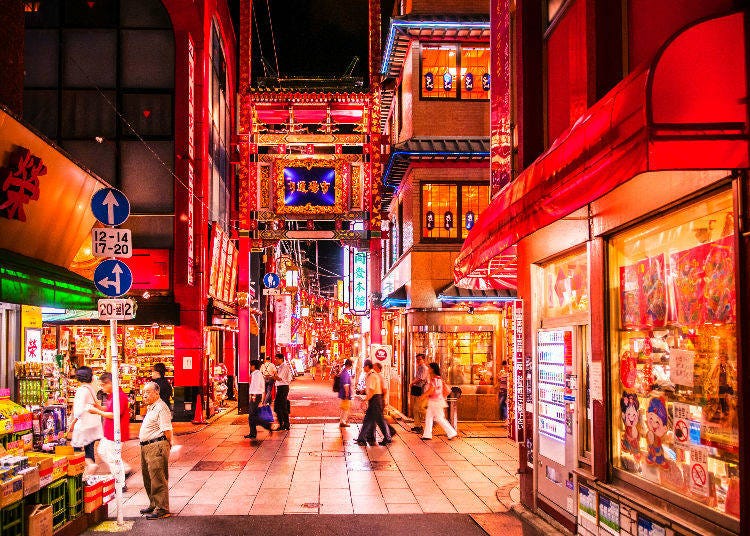
Yokohama Chinatown (PixHound / Shutterstock.com)
- Access from Tokyo: Shibuya Station to Yokohama Station (Tokyu Toyoko Line); around 30 minutes from Tokyo
- Must-see spots: Minato Mirai, Yamashita Park, Chinatown
- Notes: Half a day is also enough to explore Yokohama, but you should definitely stay until evening to enjoy the beautiful night view. As the city is so close to Tokyo, a lot of people stay at a hotel in Yokohama to enjoy the ocean view.
Recommended Yokohama tours
8. Mount Takao: Casual Hiking Close to Tokyo
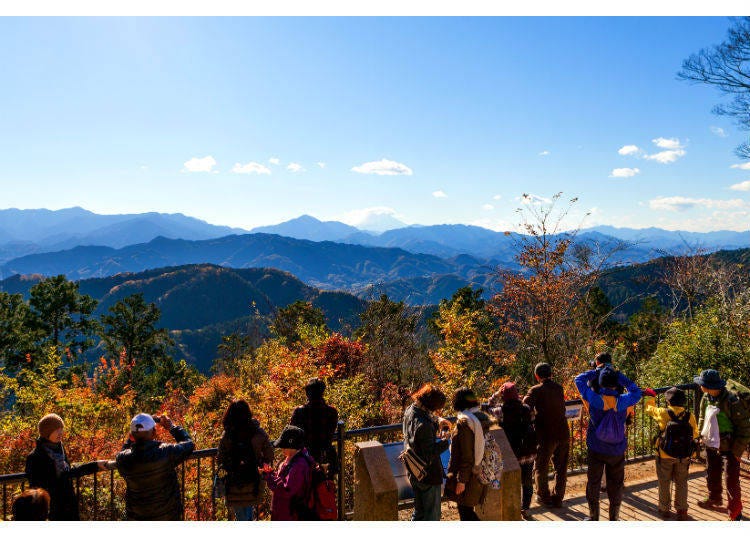
Rpmasse / Shutterstock.com
Perched on the edge of Tokyo and Kanagawa Prefecture, Mount Takao rises 599 meters above sea level, offering a verdant retreat from urban life. Recognized by Michelin’s Green Guide with a three-star rating, this mountain is a favorite among nature lovers and those looking to escape the city’s pace.
Adventure Awaits on Mount Takao!
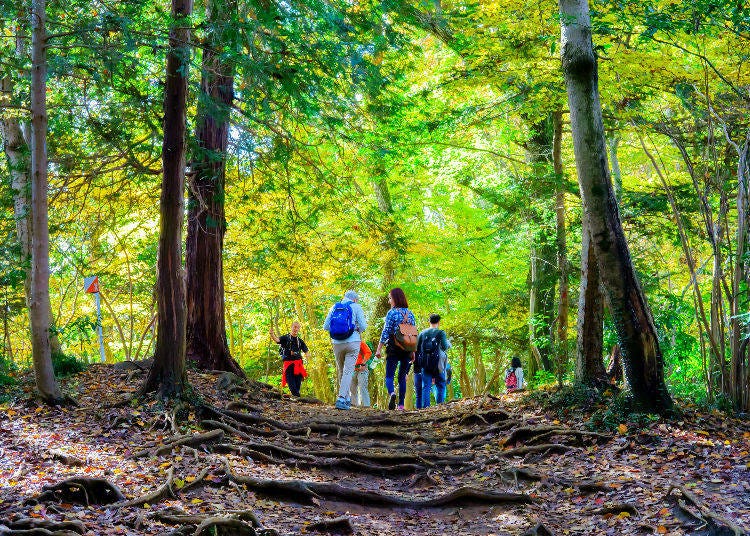
Mmpai / Shutterstock.com
1. Takaosan Yakuo-in Temple: This historic mountaintop temple complex offers a captivating blend of spirituality and cultural intrigue. Marvel at the imposing tengu statues, mythical protectors revered for their wisdom and strength.
2. Mount Takao Cable Car: Embark on a scenic journey up Mount Takao aboard the charming cable car. As you ascend, admire the lush greenery and breathtaking vistas unfolding beneath you. This comfortable and convenient ride provides effortless access to the mountain’s summit and all its wonders, making it perfect for visitors of all ages and abilities.
3. Takao 599 Museum: Delve into the fascinating world of Mount Takao’s diverse ecology at the Takao 599 Museum. Interactive exhibits and informative displays showcase the flora and fauna that thrive in this unique environment.
4. Monkey Park: Encounter playful Japanese macaques in their natural habitat at the family-friendly Monkey Park. Observe these intelligent creatures as they swing through the trees, forage for food, and interact with each other.
5. Takao Beer Mount: After a day of exploration, unwind and savor the moment at Takao Beer Mount, a beer garden perched atop the mountain. Sip on refreshing craft beers while indulging in delicious food, all with a breathtaking panoramic view of the surrounding landscape. This is the perfect way to cap off your adventure on Mount Takao.
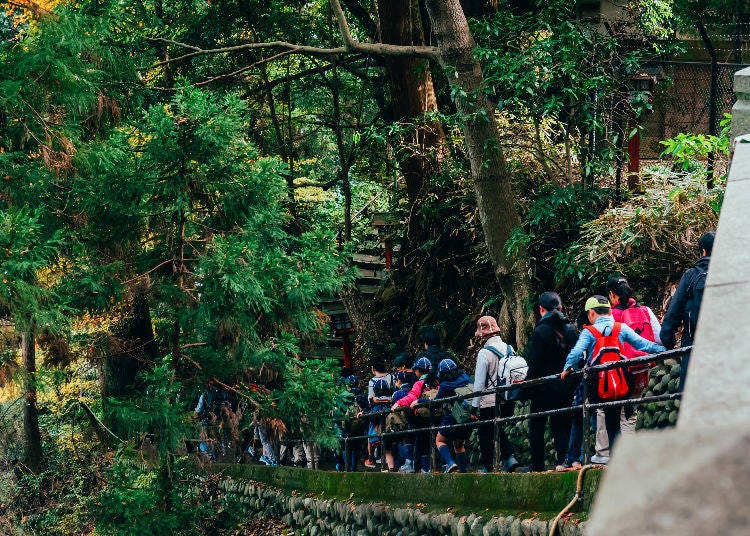
Mmpai / Shutterstock.com
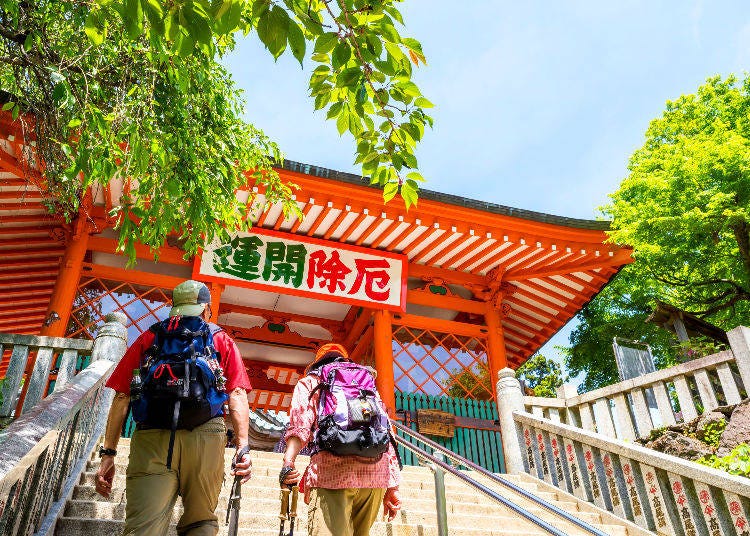
Takaosan Yakuo-in Temple (picture cells / Shutterstock.com)
- Access from Tokyo: Shinjuku Station to Takaosanguchi Station (Keio Semi Special Express); around an hour from Tokyo
- Must-see spots: Mount Takao summit, Takaosan Yakuoin Temple, Gokurakuyu hot spring
- Notes: Mount Takao is a scenic mountain with fairly easy climbing routes, but we still recommend proper shoes. There are easier and harder climbing routes, so stock up on water, food, a map, and so on. Also, there are no trash cans available, and you are expected to take your trash with you.
Recommended Mt. Takao tours
9. Chichibu (Saitama): Journey Through History, Lush Nature

Nagatoro Ravine (picture cells / Shutterstock.com)
Chichibu, located in Saitama Prefecture, is a gem of tranquility and beauty, often compared to Kyoto for its rich tapestry of temples and shrines. This city draws visitors into its serene atmosphere, offering a mix of spiritual journeys, natural beauty, and a deep dive into Japanese culture and history.
Must-Visit Places in Chichibu
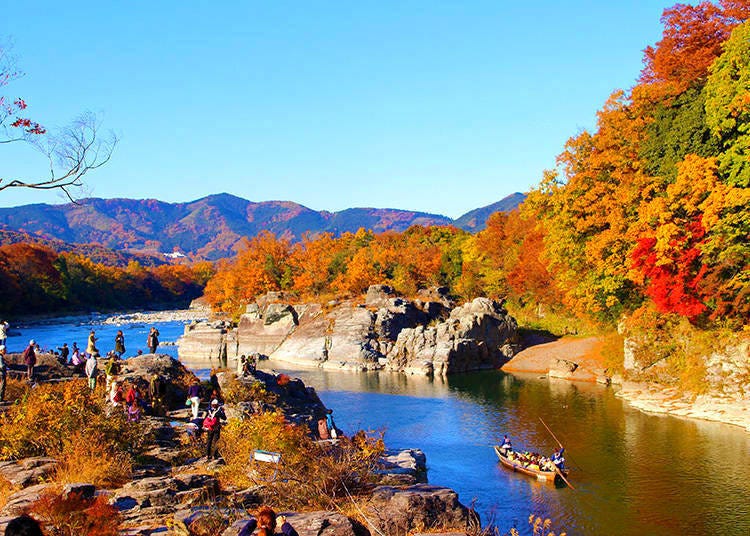
Nagatoro Ravine
1. Hitsujiyama Park: Enjoy a breathtaking spectacle unfold as over 400,000 vibrant moss phlox flowers blanket the hillside, creating a captivating carpet of color. Capture the magic of this seasonal wonder and stroll through the park, soaking in the beauty of nature’s vibrant display.
2. Chichibu Shrine: Immerse yourself in history and tradition at Chichibu Shrine. Marvel at the intricate carvings and exquisite architecture that adorn this historic landmark. As the heart of the famed Chichibu Night Festival, the shrine comes alive with vibrant floats and electrifying energy during this annual spectacle.
3. Misotsuchi Icicles: In winter, these towering icicles cascade down cliffs, creating a mesmerizing frozen landscape. Stroll through this magical world illuminated by night lights for an unforgettable winter wonderland experience.
4. Nagatoro: Unleash your inner adventurer in Nagatoro, a scenic haven nestled along the Arakawa River. Take a thrilling boat ride, navigating through striking rock formations that carve their way through the landscape.
5. Seibu Chichibu Nakamise Street: Step back in time and delve into the heart of Chichibu’s local charm. Wander through a charming traditional street lined with shops brimming with local crafts and eateries serving up regional specialties. Interact with friendly vendors, discover hidden food (and whisky!) treasures, and savor the authentic atmosphere of this delightful area.
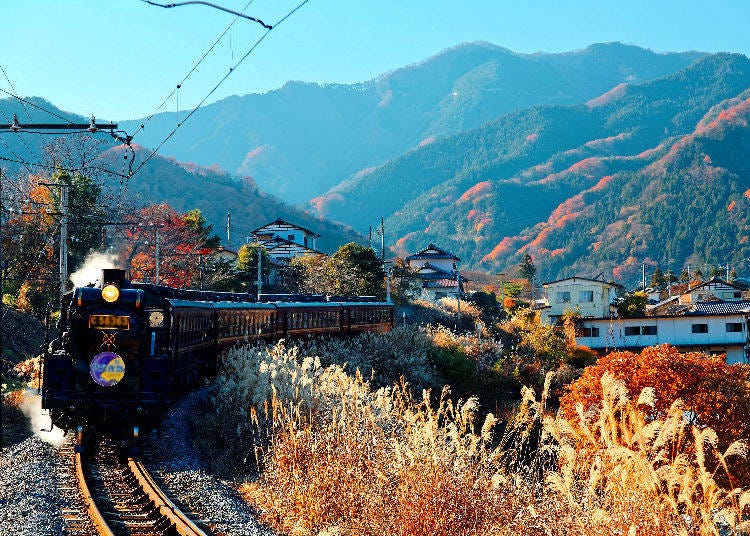
Chichibu Railway SL Paleo Express
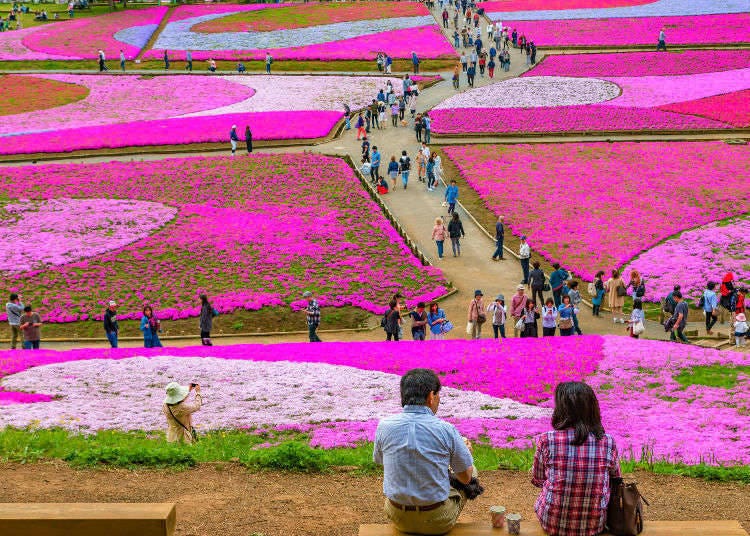
Hitsujiyama Park
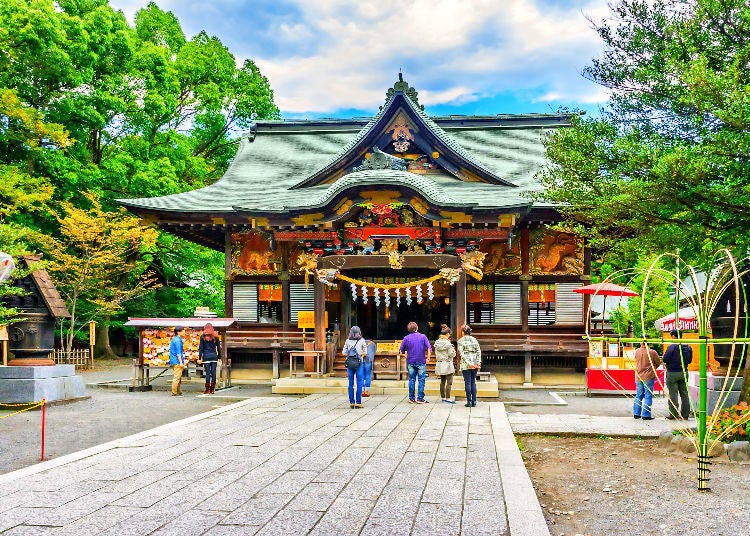
Mitsumine Shrine (SenSeHi / Shutterstock.com)
- Access from Tokyo: Ikebukuro Station to Seibu Chichibu Station (Seibu Ikebukuro Line Special Express “Red Arrow”); around 1 hour 40 minutes
- Must-see spots: Chichibu Sansha Shrine, Chichibu 34 Kannon Sanctuary, Nagatoro line descent, Chichibu Railway SL Paleo Express, Nagatoro Iwadatami Rocks, Hitsujiyama Park and Moss Phlox Hill, Onouchi Valley
- Notes: The Nagatoro descent line may be suspended between March and December, depending on the state of the river, and the Chichibu Railway SL Paleo Express generally only runs on weekends with numbered tickets. Check the details of both activities beforehand on the respective official websites (www.nagatoro.gr.jp/en/ and www.chichibu-railway.co.jp/en/)!
Recommended Chichibu tours
10. Kawagoe (Saitama): Journey Through Edo Period Charm
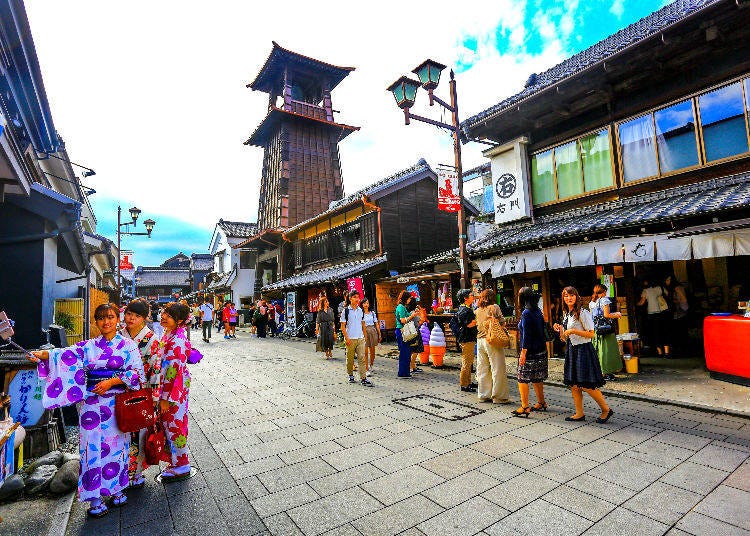
Club4traveler / Shutterstock.com
Just a stone’s throw from Tokyo, Kawagoe offers a rich tapestry of Japan’s storied past, earning it the nickname “Little Edo.” The city is a treasure trove of historical architecture, traditional sweets, and cultural experiences, making it a captivating destination for those looking to delve into the Edo period’s charm.
Must-Visit Places in Kawagoe
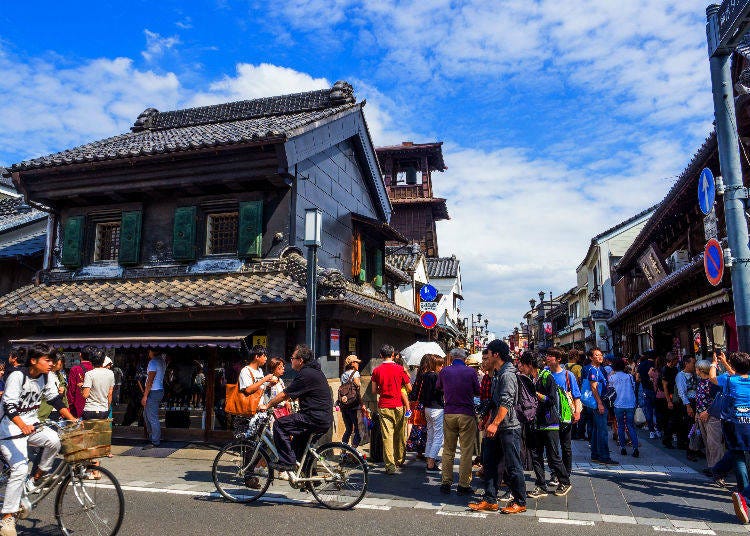
Maneerat Shotiyanpitak / Shutterstock.com
1. Kawagoe Hikawa Shrine: Seeking love or a harmonious relationship? Kawagoe Hikawa Shrine is renowned for its matchmaking powers. Participate in a cleansing ritual for inner peace or write a wish on an ema (votive tablet) for a chance at love’s embrace.
2. Kashiya Yokocho (Candy Alley): Take a delightful trip down memory lane at Kashiya Yokocho, also known as Candy Alley. This nostalgic street is a haven for sweet tooths, overflowing with traditional Japanese candies and snacks. Sample an array of colorful treats, from chewy caramels to mochi rice cakes, and discover new favorites amidst the charming atmosphere.
3. Kurazukuri Zone (Warehouse District): Step into Kawagoe’s rich merchant past by exploring the Kurazukuri Zone. Wander through a district lined with meticulously preserved warehouse-style buildings, a testament to the city’s prosperous Edo period.
4. Time Bell Tower: Harken back to a simpler time with the iconic Time Bell Tower, a symbol of Kawagoe. Hear the bell’s melodious chimes echo through the city four times a day, marking the passage of time and adding a touch of nostalgia to your Kawagoe experience.
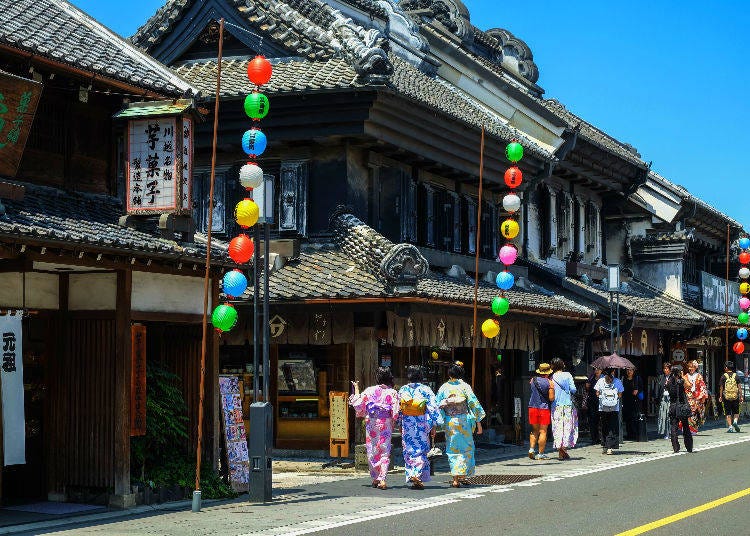
Kasama S / Shutterstock.com
- Access from Tokyo: Ikebukuro Station to Kawagoe Station (Tobu Tojo Line); around 30 minutes
- Must-see spots: Warehouse District, Toki no Kane, Kashiya Yokocho
- Notes: The main street is always crowded and bustling with tourists, but it is still a regular road with cars and buses. Traffic is plentiful and the sidewalks are narrow, so make sure to stay safe while strolling.
Recommended Kawagoe tours
Written by:

*This information is from the time of this article’s publication.
*Prices and options mentioned are subject to change.
*Unless stated otherwise, all prices include tax.





















Discussion about this post